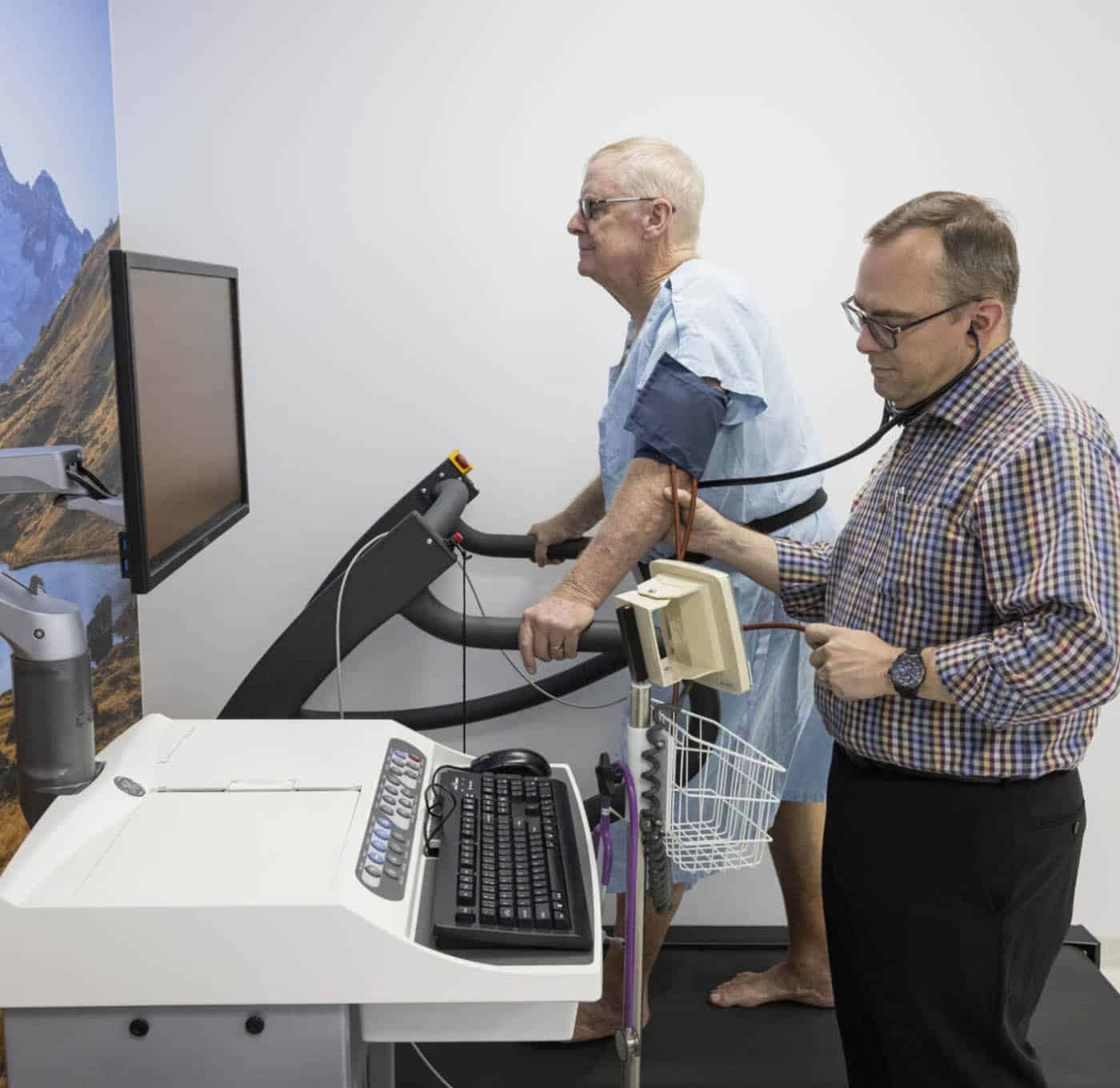Stress/Dobutamine echocardiogram
The exercise stress test measures the function of the heart, lungs and blood vessels when the body is under pressure. It helps to diagnose blocked arteries in the heart (coronary artery disease) assess abnormal heartbeats or check the function of pacemakers.

Your doctor has recommended you undergo a test called a Dobutamine echocardiogram. Procedurally, this is similar to an exercise stress test (see separate information sheet) but includes the provision of a drug called Dobutamine to help facilitate a test result if required.
You might not have heard this medical term before now and may be feeling unsure about the nature of the test.
This information sheet will outline what the test is and what preparations and risks are involved.
After you read this information sheet, you might still have questions. If you do, please contact the team at Heart HQ. We’re here to help.
What's a stress/Dobutamine echocardiogram?
The exercise stress test measures the function of the heart, lungs and blood vessels when the body is under pressure. It helps to diagnose blocked arteries in the heart (coronary artery disease) assess abnormal heartbeats or check the function of pacemakers.
The test is performed at our clinic by our trained cardiac scientists.
Patient preparation
Only have light meals on the day of your test and no heavy meals prior. You may drink water but no caffeine or stimulants such as coffee, Coke or tea. Please do not smoke prior to your test.
Before your test please take your usual medication, unless your cardiologist has advised otherwise.
You will need to wear comfortable clothing and rubber soled walking or running shoes that are suitable for exercising. We suggest wearing shorts or pants as clothing from the waist up will need to be removed during the test to gain access to your chest.
Do not use bath oil, lotion or powder on the morning of your test. You may use deodorant.
It is advisable that you are driven to your appointment by a support person such as a spouse, relative or friend.
What happens in the test?
There are two parts to this test. First, a cardiac scientist will perform an echocardiogram using an ultrasound machine. An echocardiogram checks how your heart functions when resting and ensures that no functional or structural abnormalities are present. You will lie on your left side. To ensure good contact between your skin and the probe, surgical jelly will be placed at several different sites on your chest. During this part of the test you may hear loud swishing noises. This is completely normal—it is the amplified sound of blood flowing through the valves of your heart.
In the second part of the test, your heart will be exercised or ‘stressed’. If you can walk easily, you will walk on a treadmill. The speed and slope of the treadmill will increase every three minutes. This makes your heart do more work and you will exercise quite hard. The test will be stopped if you have chest pain, become very tired or very short of breath.
When your heart is working as hard as possible, you will stop exercising and quickly lie down on the bed. More echocardiogram pictures will be taken. We understand this can be difficult for some people as you may be asked to hold your breath briefly to obtain the images.
If you have difficulty walking and can’t use the treadmill to ‘stress’ your heart, the doctor may decide to use a drug called Dobutamine. This drug copies the effect of exercise on the heart and makes the heart work faster and harder. A small needle or cannula will be inserted into your hand or arm and the Dobutamine will be given slowly through this needle for 20 minutes. You will be monitored closely through the duration of the test. If you feel unwell you should tell staff immediately.
What are the risks of this specific investigation?
A test such as this one carries some element of risk, often very small and rare.
Your doctor has balanced the benefits and risks of carrying out the test against the benefits and risks of not proceeding. If your doctor has recommended this procedure, they believe there is benefit to you going ahead.
It’s important you understand the risks involved so you can make an informed decision.
Here are the most commonly reported risks and complications associated with a Dobutamine echocardiogram.
Common risks and complications (more than 5% of cases)
- Mild angina
- Shortness of breath
- Musculoskeletal discomfort
Rare risks and complications (less than 1% of cases)
- Abnormal heart rhythm that usually settles without treatment
- Build up of fluid in the lungs—you may need medication to treat this
- Severe chest pain—this is treated with medications
- Heart attack
- Death as a result of this procedure is extremely rare
Side effects of Dobutamine
After taking Dobutamine you may suffer headache, nausea, vomiting, restlessness, muscle cramps or weakness, chest pain, shortness of breath (feeling puffed), dizziness, palpitations and rash.
Stress/Dobutamine echocardiogram info sheet